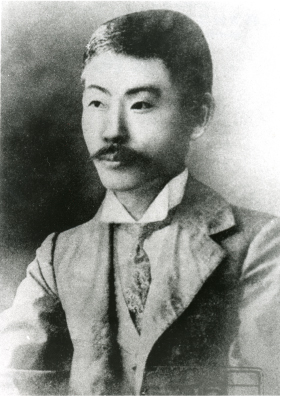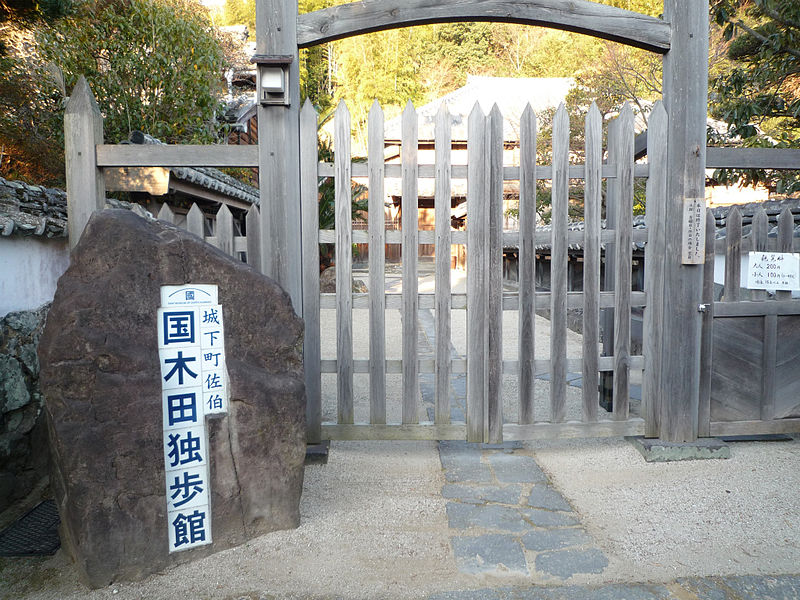<Back to Index>
- Philosopher Jacques Derrida, 1930
- Writer Kunikida Doppo, 1871
- Dictator of Argentina Leopoldo Fortunato Galtieri Castelli, 1926
PAGE SPONSOR


Kunikida Doppo (國木田 獨歩, 15 July 1871 – 23 June 1908) was a Japanese author of novels and romantic poetry during the Meiji period, noted as one of the inventors of Japanese naturalism.
Kunikida Doppo was born in Chōshi, Chiba prefecture. His real name was Kunikida Tetsuo. While some doubt exists as to his biological father, Doppo was raised by his mother and her samurai - class husband. The family moved to Tokyo in 1874, but relocated to Yamaguchi prefecture and Doppo grew up in Iwakuni. The rural area of Choshu left Doppo with a love of nature and influenced the naturalism which later appeared in his literature. Doppo quit school in order to help support his family in 1888, but left for school in Tokyo in 1889.
He studied at the English department of Tōkyō Senmon Gakkō (now Waseda University). Interested in western democracy,
his politically defiant attitude toward the school's administration
resulted in his expulsion from the school in 1891. When he was 21 years old, he was baptized by Uemura Masahisa and became a Christian. His religion and the poetry of William Wordsworth influenced his later writing style. Doppo founded a literary magazine Seinen bungaku ("Literature for Youth") in 1892 and began his journal Azamaukazaru no ki ("An Honest Record") in 1893, the same year he began teaching English, mathematics, and history in Saiki, another rural area of Japan. In 1894, he joined the news staff of the Kokumin Shimbun as a war correspondent. His reports from the front during the First Sino - Japanese War, which were collected and re-published after his death as Aitei Tsushin, ("Communiques to a Dear Brother") found high favor among the readers. The following year Doppo settled with his parents in Tokyo, where he edited the magazine Kokumin no Tomo ("The Nation's Friend") and met his future wife, Sasaki Nobuko, on whom Arishima Takeo is thought to have based his famous novel Aru Onna. Against her parent's wishes (Nobuko's mother encouraged her to commit suicide
rather than marry Doppo), the couple was married in November 1895.
Doppo's ensuing financial difficulties caused the pregnant Nobuko to
divorce him after only five months. The failed marriage had a traumatic
effect on Doppo, and his depression and mental anguish over the
separation can be seen in Azamukazaru no Ki ("An Honest Diary"), published from 1908 – 1909. Shortly after his divorce, Doppo turned to the genre of romantic poetry when co-authored an anthology, Jojoshi ("Lyric Poems"), in 1897 with Tayama Katai and Matsuoka Kunio (a.k.a. Yanagita Kunio). Around this time Doppo published several poems that would eventually be collected in Doppo gin as well as the short story, Gen Oji ("Old Gen"). Through his poetic style, Kunikida introduced a fresh current into romantic lyrical literature. Doppo remarried in 1898, to Enomoto Haruko, and published his first short story collection, Musashino ("The Musashi Plain") in 1901, which portrayed people who fall behind the times. However, Doppo's style began to change. Although Haru no Tori ("Spring Birds"), written in 1904, reportedly reached the highest level of romanticism in his era, his later works, such as Kyushi ("A Poor Man's Death") and Take no Kido (The Bamboo Gate), indicate that he was turning more towards naturalism over romanticism. Following the Russo - Japanese War in 1905, Doppo started a publishing business that went bankrupt two years later. He contracted tuberculosis in 1907 and died from the disease in 1908 at the age of 36. His grave is at Aoyama Cemetery in Tokyo.